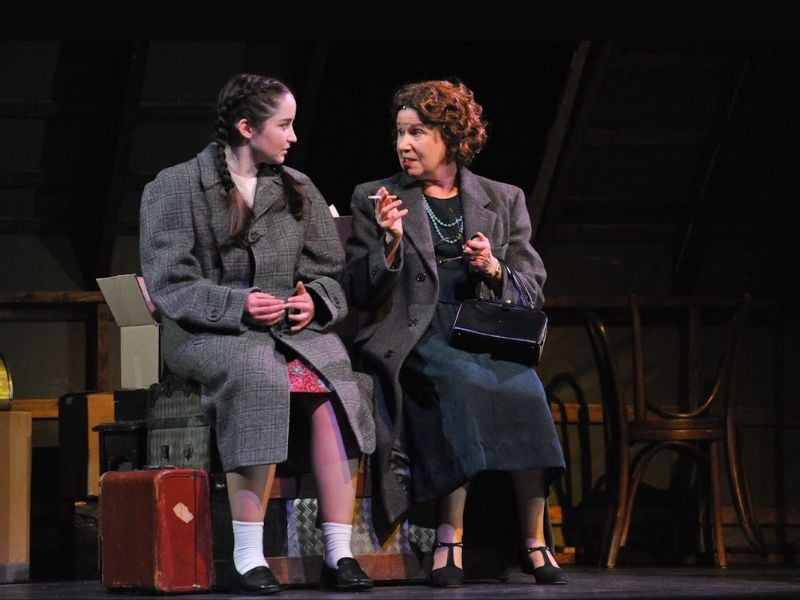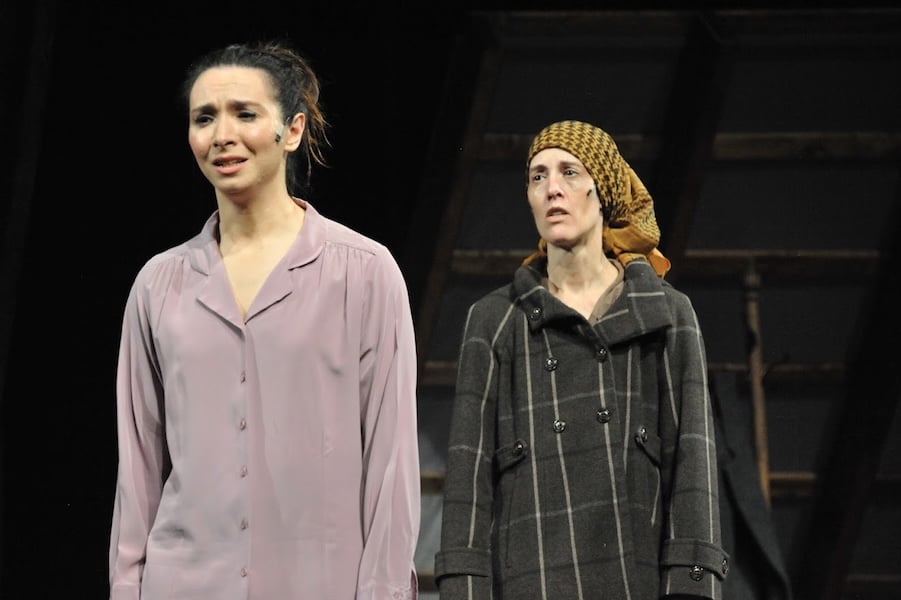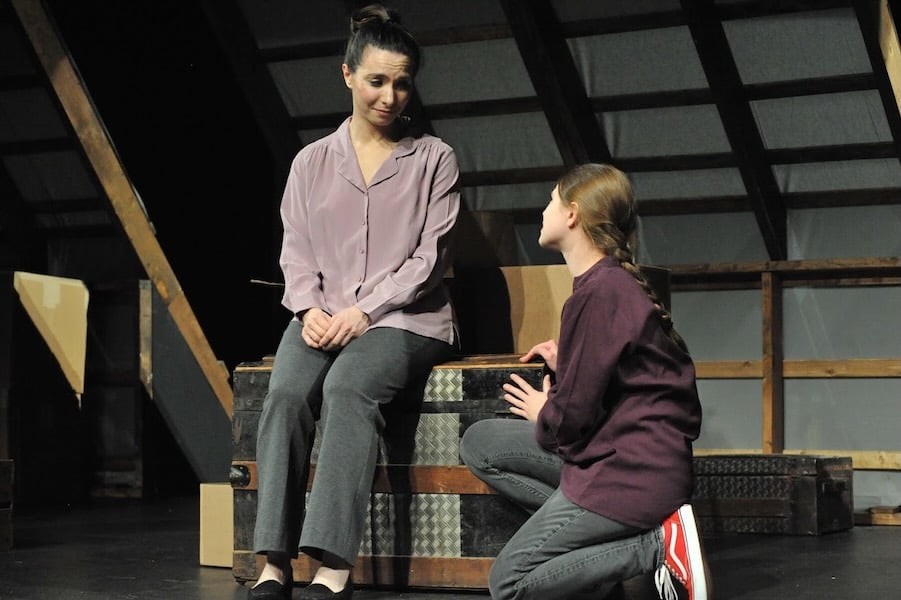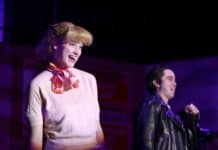Second only, perhaps, to “Never Again,” “Never Forget” are the bywords of Holocaust remembrance. But what if forgetting — deliberately, insistently forgetting — becomes the coping mechanism that someone finds necessary to deal with her own Holocaust-related trauma? That is the central question of Diane Samuels’ Kindertransport, now playing at Rockville Little Theatre.
“Kindertransport” refers to rescue projects that, in the runup to World War II, sent thousands of unaccompanied German children, mostly Jewish, to the UK, where they were cared for by foster parents recruited for the effort.

In 1939 Hamburg, Helga (Mariel Penberthy), fearing for the safety of her 9-year-old daughter Eva (Rose Armstrong), prepares to put the girl on a train, the first step on her journey as a Jewish refugee. Helga promises her daughter that she and her husband will join her as soon as possible. At the other end of the trip, in Manchester, Eva meets Lil (Susan Holliday), her foster mother-to-be.
The structure of Samuels’ play exemplifies a well-known William Faulkner quote: “The past is never dead. It isn’t even past.” Eva’s past as a child refugee occupies the stage simultaneously with her 1980 present as Evelyn (Leyla Doany), the middle-aged mother of Faith (Elizabeth Davis), her college-age daughter, Lil moves seamlessly between the play’s time frames as a mother figure to Eva and a grandmother figure to Faith.
There are echoes of Eva’s childhood experiences in Evelyn’s and Faith’s characters. When Lil takes Eva to yet another train to evacuate Manchester during the Blitz, Eva collapses from a panic attack. Decades later, Evelyn still suffers from panic attacks. Having been torn from her family, Eva fears the “Ratcatcher,” a foreboding, child-snatching character from a version of the Pied Piper story. For reasons she does not understand, perhaps as a matter of unspoken generational trauma, Faith cannot bring herself to launch into her own flat.
Having given up hope of seeing her parents again, the teenage Eva determines to fully assimilate as an immigrant to the UK, gaining British citizenship, accepting baptism into the Church of England, and storing the physical evidence of her former life — the Ratcatcher story book, documents, toys, a harmonica — in a trunk that is never opened. The trunk is one of the key elements of director Karen Fleming’s and Steve Leshin’s set, which represents the cluttered attic of Evelyn’s home. It is a storage place for memories and emotions as well as objects.
Evelyn has never spoken of her past to Faith, a silence that Lil has kept as well. When Faith discovers the contents of the trunk, she feels betrayed. Her Jewish heritage comes as a complete surprise. Their mother-daughter dynamic, already fraught, becomes angrier.

Kindertransport is very much a story of mothers and daughters: Helga and Eva, Eva and Lil, Evelyn and Faith. The only male presence is a collection of minor characters nicely portrayed by Ron Ward, most importantly, the legendary ratcatcher himself. The ratcatcher motif resonates with Eva/Evelyn, who, like the children of Hamelin, was whisked away from her home and parents without knowing why.
Doany physically and vocally embodies the buttoned-up, tense, unbending nature of Evelyn, a woman who has built up such high walls against the pain of her past that she cannot let herself out or allow her daughter in. Armstrong is more convincing as the teenage Eva than as a young child, her strongest scene being a confrontation with Helga, who — to Eva’s surprise and, to some at least subconscious extent, dismay — has survived the Holocaust and come to collect her and take her to America. Having constructed a new self in England, Eva does not welcome Helga’s reappearance in her life. Eva/Evelyn remains angry at having been sent away from her family, even as it saved her life.
In that scene, Penberthy is effective as a wraith-like survivor, astonished by her daughter’s rejection. Her 1939 Helga, strong and steadfast, does not become overtly emotional as she takes the most difficult action of her life. As Faith, Davis seems a very contemporary late teenager who begins to grow into a fuller sense of herself with the additional context for her life provided learning of her mother’s background. Aside from a limp in her 1980 incarnation, Holliday’s Lil does not change much between 1939 and 1980. Fortunately, she is portrayed not as a saintly savior type but as a more complex woman whose caring instincts mingle with her own limits and prejudices.

Judy House’s costume design effectively matches the characters. The contrast between Helga’s pre- and postwar costumes is striking. Ward gets the most costume changes. His ratcatcher outfit is as dark and ominous as it should be, and his other characters (e.g., an official checking Eva’s documents and luggage on the train) get appropriate looks as well. Lil wears a rather housewifely print throughout. Evelyn’s neutral outfit works for her character’s desire to blend in.
Jeff Goldgeier’s sound design sets moods for scenes well, though in a few instances, the underscoring partially covered dialogue. Elaine Ferrell’s lighting design illuminated the transitions between the 1939-47 and 1980 sequences. This is an accent-laden show, and Gary Sullivan’s dialect coaching helped to create credible speech patterns by the actors. Eva’s change of accent between her childhood and teenage selves was particularly satisfying. Fleming’s direction kept the show’s shifting time frames clear to the audience, though at times the more charged interactions between mother/daughter pairs devolved too much into yelling.
When she can no longer hide her history, Evelyn tries, almost desperately, to physically destroy the evidence of where she came from. This act of forgetting — an adamant denial not only of her personal history but of her parents’ sacrifice and what led to it — is her tragedy. Forgetting, the play makes clear, is no solution to the ongoing problem of antisemitism nor, indeed, acts of hatred directed against any disfavored minority.
Running Time: One hour and 50 minutes, including one intermission.
Kindertransport plays through February 9, 2025 (Friday and Saturday evenings at 8 pm, Sundays at 2 pm), presented by Rockville Little Theatre performing the Bender Jewish Community Center, 6125 Montrose Road, Rockville MD. Tickets ($22; $20 for students and seniors) may be purchased online, by emailing tickets@rlt-online.org, or by calling the box office at 240-314-8690 from 2-6 Tuesday through Friday and from 10-2 on Saturday.
COVID Safety: Masks optional.
Kindertransport
by Diane Samuels
CAST
Evelyn: Leyla Doany
Faith: Elizabeth Davis
Eva: Rose Armstrong
Helga: Mariel Penberthy
Lil: Susan Holliday
The Ratcatcher: Ron Ward
CREW
Producer: Teresa Gillcrist
Director: Karen Fleming
Stage Manager: David Gorsline
ASM: Michal Kaufer
Set Design: Bill Dunbar/Karen Fleming
Set Construction: Steve Leshin
Lighting Design: Elaine Ferrell
Sound Design: Jeff Goldgeier
Properties: Nancy Davis
Costumes: Judy House
Dialect Coach: Gary Sullivan
Dramaturg: Pauline Griller-Mitchell
Board Liaison: Natalie McManus



